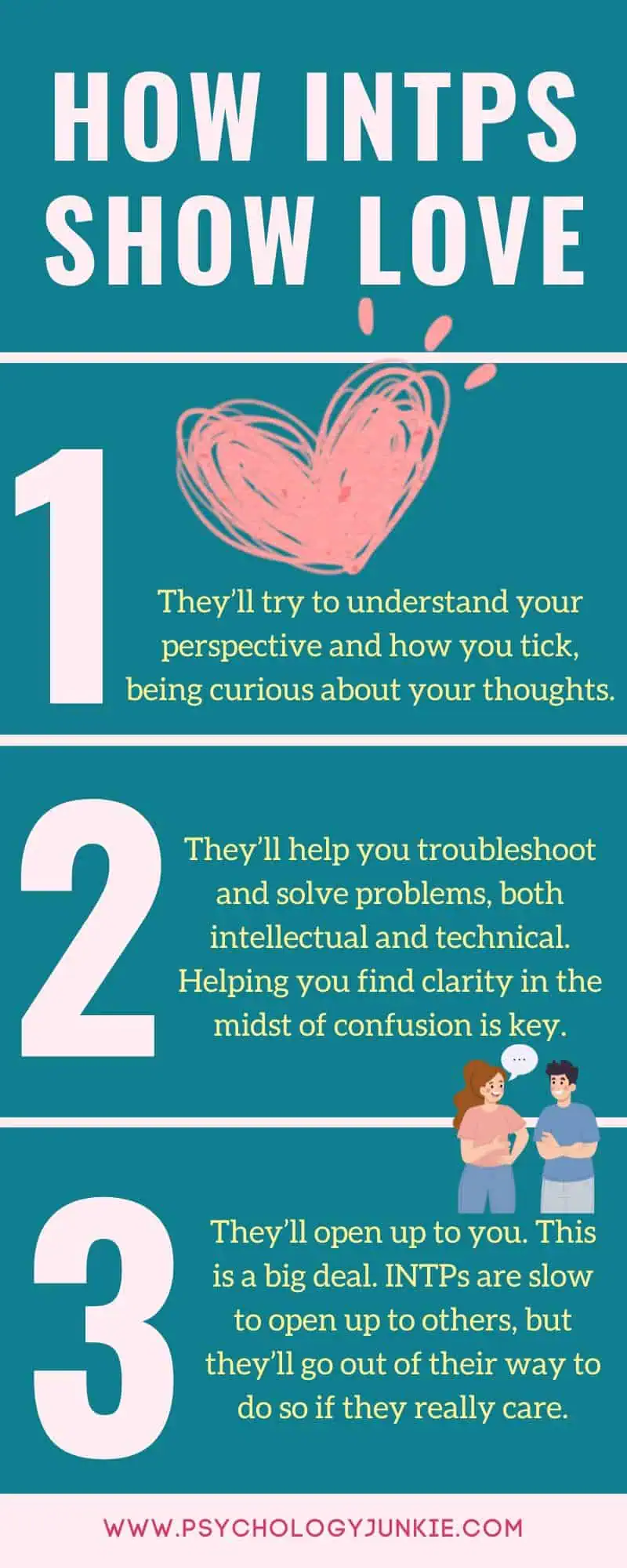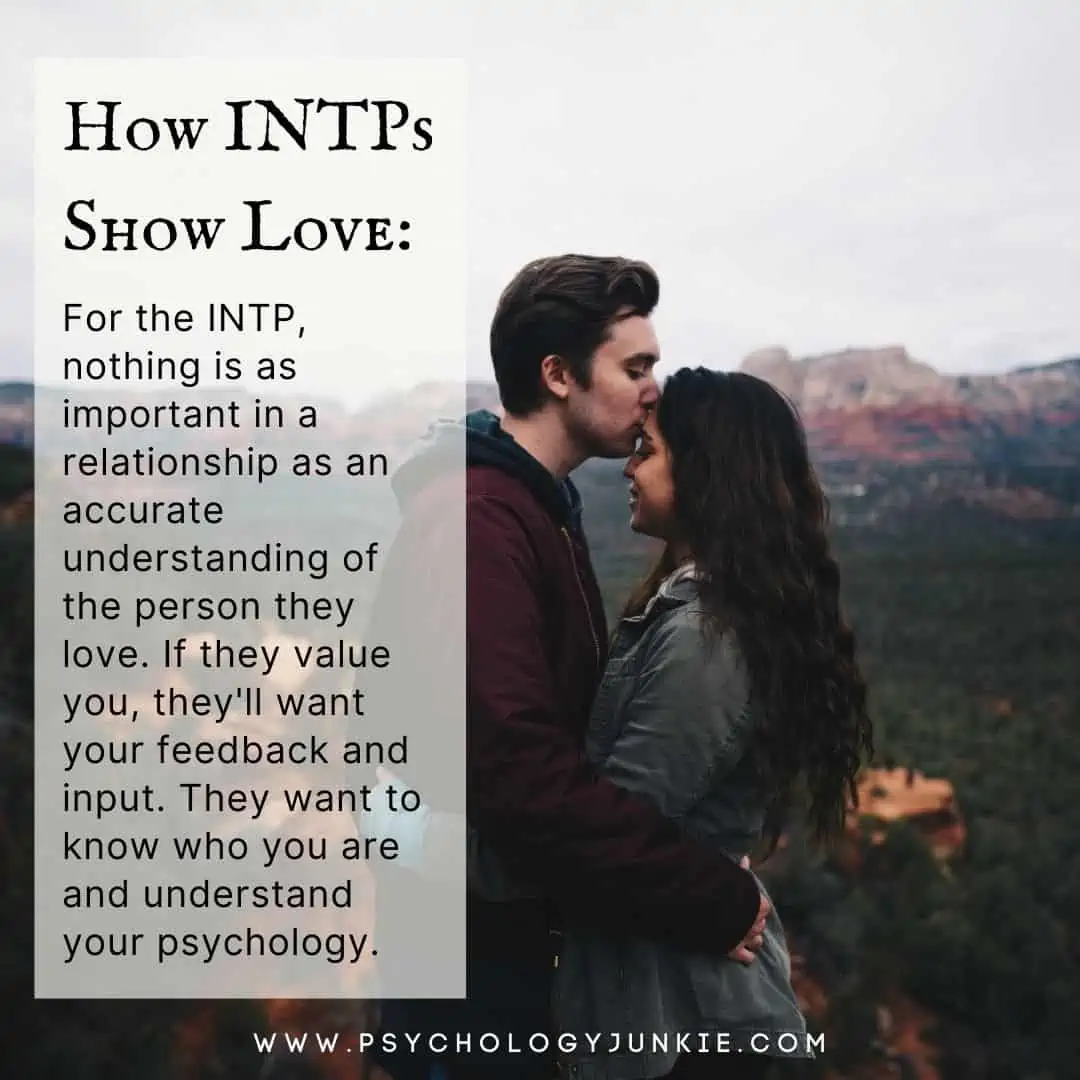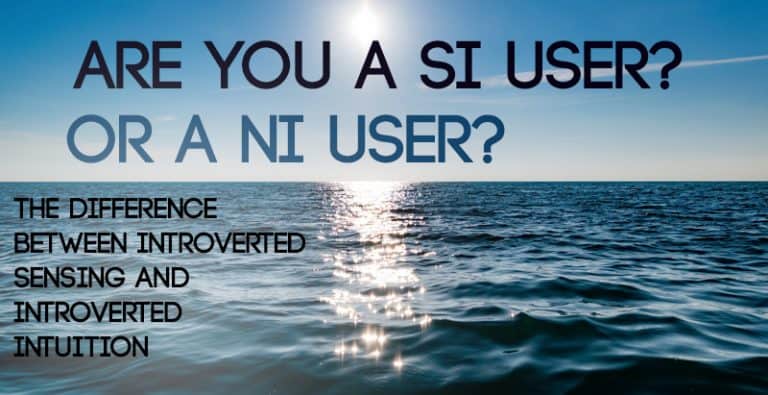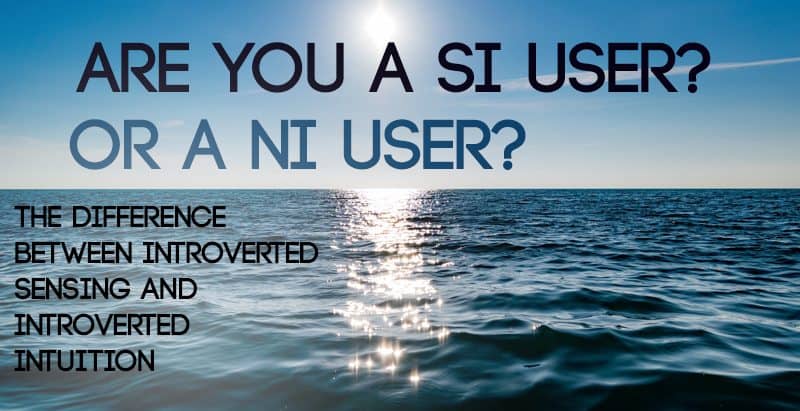How INTPs Say “I Love You”
How do INTPs show love? Some types nearly burst at the seams with emotion, while others keep their feelings much more contained. INTPs are part of the latter group, more reserved and cautious when it comes to expressions of love. They tend to express themselves in more subtle ways than other more effusive personality types (we’re looking at you extroverted feeling types). Unfortunately, this means that their expressions of love are often unappreciated or even unnoticed. That’s something I hope I can combat in this article so I hope you’ll stick with me in understanding this complicated and creative personality type.
Not sure what your personality type is? Try out our most highly recommended personality questionnaires:

- You can take our free personality questionnaire here
- You can take Personality Hacker’s highly accurate personality questionnaire.
- You can take the official Myers-Briggs Type Indicator® for $49.95
This article contains an affiliate link to a questionnaire on Personality Hacker. If you purchase one of their courses, I get a small kickback that I can use to pay for hosting and other demands of this site. I only recommend courses I love.
How INTPs Show Love
For the INTP, nothing is as important in a relationship as an accurate understanding of the person they love. The idea of jumping to a conclusion is anathema to them. Linda Berens calls INTPs a “Behind-the-Scenes™” type, and these types have a quiet, calm style and a need to integrate lots of information and viewpoints. These types care more about reaching an accurate or best result than moving quickly. While they may appear more detached and distant than some people, they also will make sure they understand what you’re trying to say before they jump in with advice or opinions.
They’ll be honest with you
INTPs hate sugarcoating, but they also try not to be overly brusque or hurtful. This is a fine line to walk and one that can make them feel a little unsteady and nervous in relationships. One part of them wants to be very specific and accurate and another part wants to have harmonious interactions. In the end, they often try to blend the two with people they care about. At the same time, it’s in their nature to prioritize accuracy. So if you notice that an INTP is trying very hard to be tactful while also trying very hard to be as honest and accurate as possible, chances are they care about you and how their words are going to be received by you.
INTPs will try to intellectually inspire you
For INTPs, finding a “mind mate” – someone who they can discuss intellectual ideas and theories with – is incredibly important. They thrive on being able to get into weighty, abstract topics, and need someone who can enjoy their thought process and who can understand their need to explore new ideas. INTPs have an inherent need to debate, hypothesize, and swap knowledge and ideas. So if you find them questioning, debating, or posing critiques to your argument, don’t take this as a sign of dislike or disrespect. It’s simply another form of intimacy and fun for them!
They seek your input
INTPs enjoy a consultative decision-making process. If they value you, they’ll want your feedback and input. They want to make sure that their ideas are fully fleshed-out and that there are no loopholes or gaps. If they care deeply about you, they’ll consult you on major decisions and quietly ponder your responses. They value weighing all the pros and cons and giving everyone a chance to have their say.
They’ll respect your space
INTPs need a lot of alone time to process their thoughts and recharge. This is not something they can do in a noisy or chaotic environment, so they like to be alone to reflect and breathe. This need for autonomy is important for INTPs, and they try to extend this same courtesy to the people they love. They’re usually careful to give their loved ones the space they need to think and process their own thoughts. They want to make sure their loved ones have the autonomy they need to come to their own conclusions and make their own decisions without being pressured to be like everyone else. For some personality types, love looks like “let me in” and for an INTP love can sometimes look like “I’ll let you be. I know you need your space.”
“Sometimes I get annoyed because my efforts to show love are so unseen. I’ll tell my wife that she can have the weekend to herself and I don’t make a lot of plans even though there are things I’d like to do with her. But she just sees it as me neglecting her. I’ve had to work hard at realizing the things I value (space, time, independence) are, in fact, the opposite of what she wants from me. Don’t get me wrong. I love spending time with her. I don’t want to be left alone constantly. But respecting space is just something I do to show someone I’m respecting them as a person.” – Martin, an INTP
They’ll help you troubleshoot
INTPs are natural problem solvers, and if they love you they’ll make extra time to try to help you with break down complex issues. They use their creativity and imagination to come up with unconventional ways of dealing with difficult challenges. Often their ideas are unusual but logical; they’re not afraid of thinking outside the box. If you’re feeling stumped or out of ideas, the INTP will be happy to step in and brainstorm with you.
They say “I love you”
It might seem obvious that the words “I love you” would show love, but many people are skeptical of these words. INTPs don’t say “I love you” lightly. Remember how I said accuracy and honesty are so important to this type? For the INTP, saying I love you is a big deal. It’s vulnerable and probably even a little scary. They’re never going to say it “just to be nice” or to manipulate you.
“Saying ‘I love you’ is really difficult for me. I mean it long before I say it, but I just overthink it so much. I can’t imagine blurting it out without meaning it so it confuses me when people use it as a manipulation tactic.” – Lucas, an INTP
They’ll be curious about you
INTPs are naturally curious about the world around them and that includes the people they care about. If they love you, they’ll ask questions and listen carefully to what you have to say. To the INTP everyone is a complex puzzle and they want to figure out what pieces make up your psychological puzzle. To some people, their questions can seem intrusive, but they don’t typically mean it to be intrusive. Realize that for INTPs analyzing someone is just one of the ways they can show they care.
They will open up to you
It’s true that INTPs can be quite private, but when they are with someone they love, they try to open up and be more vulnerable. This is an important step for them and it’s a sign that they care deeply about the relationship. It may take time for an INTP to open up, but when they do, it’s a sign of trust and deep feeling.
Common hardships for INTPs in a relationship
Relationships can be tricky for anyone, but they can be especially challenging for INTPs because they are such a private and complex personality type. In an extroverted world it’s expected that people will be outspoken and open, but that’s not something that comes naturally to INTPs.
“They (INTPs) are inclined to be shy except when with close friends, and their reserve is difficult to penetrate. For all these reasons, INTPs are often seen as difficult to know, and are seldom perceived at their true level of competency.” – Keirsey, David. Please Understand Me II
INTPs are known for being analytical and innovative, but they can sometimes have trouble understanding emotions. This can be a problem in relationships, where partners may feel that the INTP is too distant or “oblivious.” But is this really accurate?
Are INTPs disconnected or unconcerned with their partner’s feelings?
It may seem to some people like INTPs don’t care – at least from outside perception. But this is by no means the truth.
To understand what is really happening we need to look into the mind of an INTP.
The INTP personality type is characterized by a preference for logical and analytical thinking. This means that they feel most confident when they are looking at systems and arguments to see how they all fit together. As dominant introverted thinking types, INTPs trust themselves when it comes to understanding logical principles, spotting inconsistencies, or taking apart or building arguments. But INTPs tend to feel less sure of themselves when it comes to the world of feelings, emotions, and interpersonal exchanges.
INTPs often feel awkward and embarrassed attempting to read a partner’s emotions because they don’t have much confidence in that area. It’s not an ability they use frequently, even though they can sense when emotions are present. Because of this, they often feel stumped or confused when their partner is in an emotional place or expects some kind of emotional response from them. They worry about getting it wrong, making a miscalculation, or amplifying any negative emotions in their partner.
Some Tips for INTPs (and Their Partners):
- Remember that someone’s emotional experience is important, even if it doesn’t fit into your logical framework.
- Don’t be afraid to ask questions and get clarification if you’re unsure of what your partner is feeling.
- Make sure to take time for yourself to relax and calm down when emotions become overwhelming.
- Try to rephrase what you think your partner is feeling back to them, asking if you are correct. This alone can make your partner feel heard and validated.
- For partners of INTPs, don’t assume that their lack of emotional expression means that they don’t care. Remember that it may be difficult for them to process their feelings and express them in a way that you can understand. They still want to know what you’re going through and provide support. They may offer it more in terms of troubleshooting than commiserating, however.
Feeling Trapped
INTPs crave autonomy and they aren’t as interested in getting locked into traditional roles. If an INTP enters a relationship, or especially a marriage, where they feel constrained by traditional expectations they can become overwhelmed and caged-in. Whether they’re being roped into social engagements, expected to conform to a specific gender role, or being held to duties or expectations that don’t match up with their own principles, INTPs can feel stifled.
It’s important for both the INTP and their partner to be clear about each other’s needs and to create a space of compromise where both individuals are respected and appreciated without losing themselves in the process.
Some Tips for INTPs:
- Talk about your values early on in a relationship to see whether they match up with those of your partner. This can give you a heads-up to any potential conflicts that may arise in the future, or areas that may take more work.
- If you’re in a committed relationship, talk about responsibilities and split them up in a way that seems fair to both of you. Then follow through on that commitment.
- If you feel like you’re being forced into a role that doesn’t fit you, take some time to analyze what it is about that role that’s bothering you. What principles are being violated, if any? Are you being challenged in a good way, that maybe isn’t comfortable yet? Or are you being challenged in a way that is hurtful to you as a person? After taking some time to sort this out, bring up your thoughts to your partner and see if you can come to an agreement on what expectations are fair or what expectations may need to be changed.
- Make sure you’re getting space to do your own thing in an unstructured way. As an introvert and a perceiver, it’s crucial that your time not be planned out every second of the day. You need alone time and you need some free, unstructured time to follow your interests wherever they may lead you.
Being Misunderstood:
INTPs are often misunderstood and underestimated in every day life. They often have creative thoughts or ideas but they are often led to believe that the world doesn’t care about those things. In childhood they are often dismissed as being “disrespectful” when they pose an argument or “pedantic” when they critique a word choice.
In a world that is very fixated on how people “feel” more than what’s logically consistent, INTPs can feel like the veritable square pegs in round holes. On top of that, INTPs are less concerned with social expectations and less aware of what will come across as stereotypically “impressive” so sometimes when they express themselves they lack the charm or emotional subtext that would make others more receptive to their ideas.
This can be a difficult experience for INTPs to deal with in general, but even harder when it comes to relationships. When someone is close to you and doesn’t understand what you’re saying or thinking, it can easily lead to hurt feelings and misunderstanding.
Some Tips for INTPs:
- Be patient with yourself and your partner. You often need some time to process your thoughts before you can express them, so give yourself the space you need to do that. Give your partner time and space to ponder what you’ve said as well.
- Try different ways of expressing your emotions until you find one that feels like it works best for both of you.
- Explain things logically, but experiment with adding some color or emotion to your explanations.
- Ask your partner questions about the things they don’t understand and give them time to think of their own answers instead of immediately jumping in with yours.
- Remember that your creative and analytical mind is something that the world needs. Even if it’s not always understood or appreciated as much as it should be, it’s just as valuable as the skills and abilities that others bring to the table.
- Find like-minded people to interact with. Sometimes by joining a class, a book club, a DND event, or even an online group you can enjoy talking with people who share your love of debate, analysis, or creativity. Don’t be afraid to branch out and explore a new way to meet people who inspire you!
What Are Your Thoughts?
Do you have any insights or experiences that would inspire INTPs or help give insight to people in relationships with them? Share your thoughts in our comments section!
Find out more about your personality type in our eBooks, Discovering You: Unlocking the Power of Personality Type, The INFJ – Understanding the Mystic, The INTJ – Understanding the Strategist, and The INFP – Understanding the Dreamer. You can also connect with me via Facebook, Instagram, or Twitter!
Other Articles You Might Enjoy:
The INTP Cognitive Function Stack
















I do find I can express love when it comes to my close circle, or at times anonymously online on the internet. Though it’s true I don’t just casually act as helpful or affectionate as other types do. Not that I’m cold or rude to strangers, but I’d describe myself as having a level of friendly detachment with strangers or people I don’t know well in real life. I usually find this “detached friendliness” as more of a TP thing in my observations, especially ETPs, but ITPs have that type of thing too. It’s not that it’s fake. It’s that I experience a mild to moderate level of warmth or politeness with people, and I don’t feel the need to act like I’m extremely close to someone I just met. I don’t need to turn it up to 200% affection/warmth or act super super friendly with everyone. If I feel a mild level of warmth, then I will show a mild level of warmth to someone. I don’t exaggerate my feelings as others may seem to do.